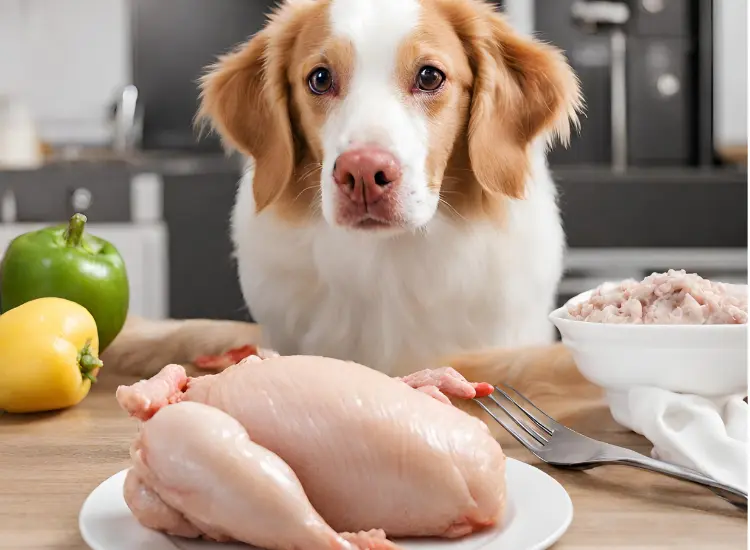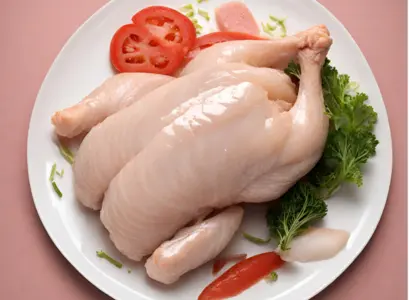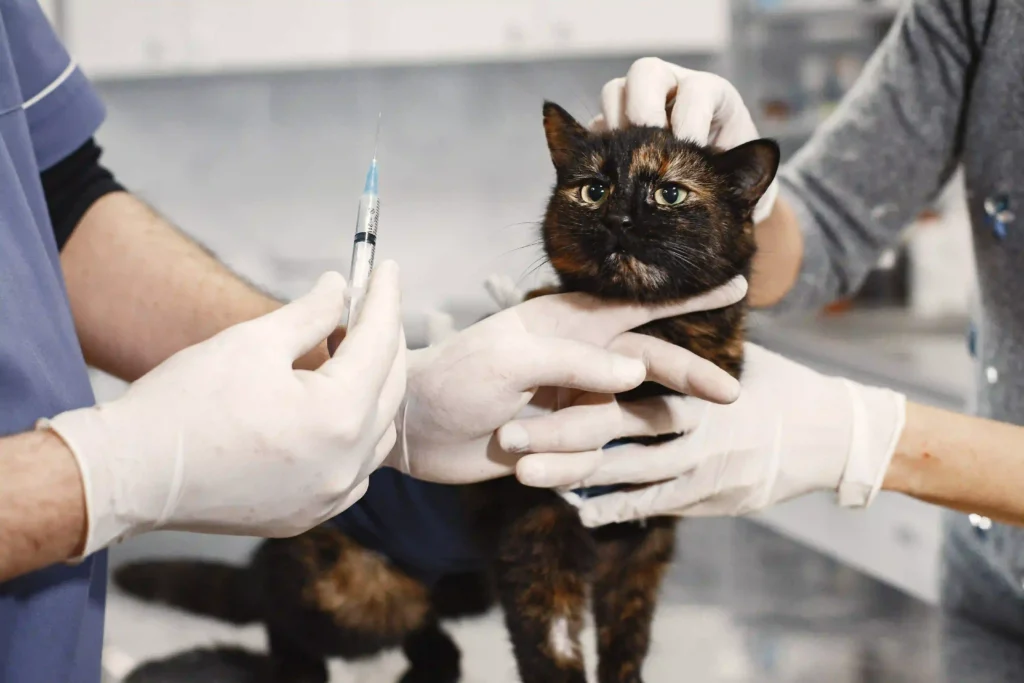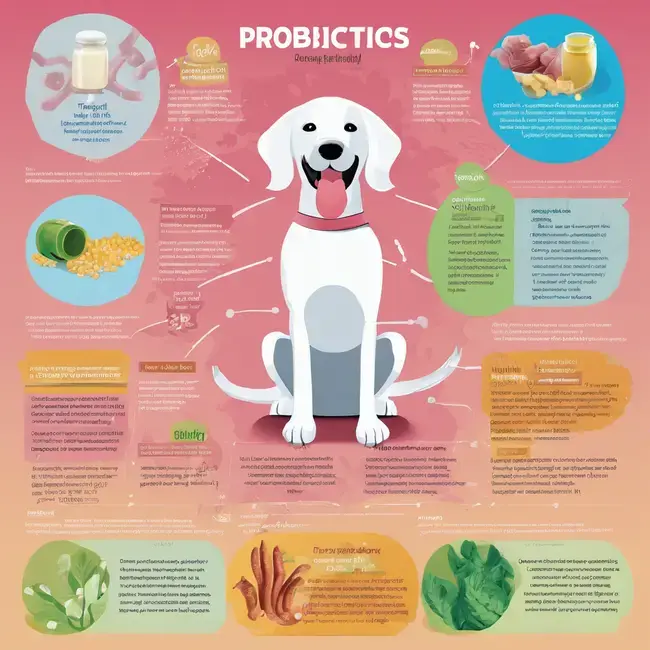Can Dogs Eat Raw Chicken? Discover 8 Key Benefits and Risks

- Can Dogs Eat Raw Chicken?
- The Debate: Benefits vs. Risks
- 8 Key Benefits of Raw Chicken for Dogs
- Potential Risks of Raw Chicken For Dogs
- Can Dogs Eat Raw Chicken Bones?
- Can Dogs Eat Cooked Chicken Bones?
- Can Dogs Eat Raw Chicken Feet?
- Can Dogs Eat Raw Chicken Liver?
- Can Dogs Eat Chicken Broth and Boiled Chicken?
- Safety Tips for Feeding Raw Chicken to Dogs
- Common Myths About Raw Chicken For Dogs
- Alternatives to Raw Chicken for Dogs
- Conclusion: Is raw chicken good for dogs?
- Frequently Asked Questions (FAQs)
- Citations and References
This post may contain affiliate links, meaning I may earn a commission if you make a purchase, at no extra cost to you. I only recommend products I trust. Thank you for your support.
Feeding dogs a raw diet has gained popularity among pet owners in recent years, and one of the common questions that arises is, “Can dogs eat raw chicken?.”
Raw chicken can be a beneficial addition to a dog’s diet, but it also comes with certain risks that need to be considered.
Raw chicken for dogs can be a contentious topic, and opinions on its safety and benefits vary. I have personally fed raw chicken to my two dogs, and trust me, it has proven to be a highly beneficial addition to their diet.
In this article, we will explore the facts and myths surrounding raw chicken for dogs, and provide you with the information you need to make informed decisions about your dog’s diet.
Can Dogs Eat Raw Chicken?
Yes, dogs can eat raw chicken, but individual tolerance varies, and there are inherent risks involved. Each dog has its own unique dietary needs and tolerances and can experience adverse reactions to certain foods, including raw chicken.
Keep in mind that selecting high-quality raw chicken is crucial to maintaining your dog’s digestive health if you’re thinking about incorporating this food into their diet.
It’s crucial to be mindful of these factors and consult with a veterinarian before introducing raw chicken into your dog’s diet.
The Debate: Benefits vs. Risks
Feeding raw chicken to dogs has its proponents and opponents, each with valid points to consider.
Let’s explore both perspectives to gain a deeper understanding of this controversial topic.
8 Key Benefits of Raw Chicken for Dogs
Feeding dogs raw chicken can provide numerous benefits for their overall health.
Here are eight key benefits of raw chicken for dogs:
1. Healthy Skin and Shinier Coat
The omega-3 and omega-6 fatty acids found in raw chicken can promote a shiny coat and reduce skin irritations.
2. Stronger Immune System
Raw chicken for dogs contains immune-boosting components that can help strengthen your dog’s immune system and fight off infections.
3. Allergy Relief
Some dogs with food allergies or sensitivities may benefit from a raw chicken diet, as it eliminates common allergens found in commercial dog food.
4. Improved Joint Health
The natural glucosamine and chondroitin in raw chicken for dogs can promote healthy joints and reduce the risk of arthritis.
5. Balanced Nutrition
Raw chicken is a source of protein, essential amino acids, and fatty acids that can contribute to a balanced diet for your dog. Proponents of raw feeding argue that these nutrients are preserved in raw chicken and can be beneficial for a dog’s diet.
6. Enzymes and Nutrient Retention
Advocates of raw feeding argue that cooking can destroy certain enzymes and nutrients present in food. They believe that feeding raw chicken to dogs can provide access to these natural enzymes and nutrients, which may support digestion and overall well-being.
7. Improved Digestion
The natural enzymes present in raw chicken for dogs can aid in digestion and optimize nutrient absorption. The absence of certain additives and processing in raw chicken can reduce allergic reactions in dogs with food sensitivities.
8. Dental Health
Advocates of raw feeding argue that chewing on raw chicken and bones can help promote dental health in dogs. They claim that the act of chewing on raw bones can assist in removing plaque and tartar from a dog’s teeth, supporting oral hygiene.
Potential Risks of Raw Chicken For Dogs
While there are potential benefits to feeding dogs raw chicken, it is important to be aware of the risks involved.
Here are ten risks of raw chicken for dogs:
1. Bacterial Contamination
Raw chicken for dogs can contain harmful bacteria such as Salmonella and Campylobacter, which can cause food poisoning. These bacteria not only pose a risk to the dog but also to the human family members who handle the raw chicken.
2. Potential of Nutritional Imbalances
Without proper planning, a raw chicken for dogs may lead to nutritional imbalances, as dogs require a balanced diet to maintain their health. Inadequate levels of essential nutrients, vitamins, and minerals may lead to health issues over time.
3. Zoonotic Diseases
Handling and feeding raw chicken to dogs can also pose a risk of zoonotic diseases, which are illnesses that can be transmitted between animals and humans. This risk is especially relevant in households with young children, elderly individuals, or immunocompromised individuals.
4. Choking Hazards and Intestinal Blockages
Feeding raw bones, often included in a raw diet, can lead to choking, intestinal blockages, or damage to the digestive system. This risk is particularly associated with weight bearing bones, which are dense and can splinter easily.
5. Increased Health Risks in Certain Dogs
Dogs with weakened immune systems, puppies, senior dogs, and pregnant or nursing dogs may be at a higher risk of developing complications from consuming raw chicken due to their vulnerable health status.
6. Parasitic Infections
Raw chicken for dogs may contain parasites such as toxoplasma or E. coli, which can cause serious health issues in dogs.
Can Dogs Eat Raw Chicken Bones?
Yes, dogs can eat raw chicken bones as they are softer and more pliable, making them less likely to splinter, thereby reducing the risk of causing harm to the dog’s digestive system.
Raw chicken bones, such as raw chicken wings or necks, are often considered safer for dogs to consume compared to cooked bones.
If offering raw chicken bones to your dog, it should be done under strict supervision, and the size of the bone should be appropriate for the dog’s size.
Can Dogs Eat Cooked Chicken Bones?
No, cooked chicken bones, especially those that are brittle, can splinter and pose a significant choking hazard or cause internal injuries to dogs. Therefore, it’s highly advised to avoid feeding cooked chicken bones to dogs.
Can Dogs Eat Raw Chicken Feet?
Yes, raw chicken feet are safe for dogs to eat as long as they come from high quality healthy chickens and are free from any harmful bacteria or contaminants.

Raw chicken feet provide several benefits for dogs as they contain glucosamine and chondroitin, which support joint health and mobility.
Additionally, the act of chewing on chicken feet can help promote dental hygiene by naturally cleaning your dog’s teeth and gums.
Can Dogs Eat Raw Chicken Liver?
Yes, dogs can eat chicken liver in moderation as part of a balanced diet. It’s recommended that raw chicken liver should account for about 5% of a balanced raw diet for dogs.
Raw chicken liver is a nutrient rich food that provides essential vitamins and minerals, including copper, vitamin A, folic acid, B vitamins, and iron, all of which are crucial for a dog’s overall health.
However, it’s essential to feed it in moderation to prevent potential vitamin A toxicity, particularly in smaller dogs.
Additionally, sourcing high quality fresh liver from a reputable supplier is vital to minimize the risk of bacterial contamination.
Can Dogs Eat Chicken Broth and Boiled Chicken?
Yes, dogs can eat chicken broth and boiled chicken as part of their diet. Chicken broth and boiled chicken are often recommended as a bland diet option for dogs with digestive upset or recovering from illness.
Chicken broth can help keep your dog hydrated and provide essential nutrients. Boiled chicken, when prepared without seasoning or additives, can be a gentle and easily digestible protein source.
However, it is important to note that chicken broth and boiled chicken should only be used as temporary solutions and not as a long-term diet.
Safety Tips for Feeding Raw Chicken to Dogs
1. Regular Veterinarian Check-Ups
Schedule regular check-ups with your veterinarian to monitor your dog’s health and address any concerns related to their diet.
2. Quality and Source
Choose fresh, high-quality chicken from reputable suppliers to minimize the risk of bacterial contamination or parasites.
3. Food Handling Practices
Keep raw chicken separate from other foods, use separate utensils, cutting boards, and food preparation areas to prevent cross contamination with other foods consumed by humans.
4. Hygiene and Cleanliness
Maintain good hygiene and cleanliness when handling raw chicken. Thoroughly wash hands, utensils, and surfaces that come into contact with raw chicken to prevent the spread of harmful bacteria.
5. Supervise Feedings
When feeding raw chicken or bones, supervise the dog to ensure safe consumption and prevent choking hazards. Avoid giving weight-bearing bones that can splinter and cause injuries.
6. Monitoring Dog’s Health
Regularly monitor the dog’s health, including stool quality, coat condition, and overall well-being. If any adverse reactions or health concerns arise, seek veterinary attention promptly.
7. Introduce Gradually
Start by introducing small amounts of raw chicken into your dog’s diet and monitor their response for any adverse effects.
Common Myths About Raw Chicken For Dogs
Several myths and misconceptions surround the topic of feeding dogs raw chicken. Let’s debunk some of the most common ones.
| Myth | Fact |
|---|---|
| Raw chicken makes dogs aggressive | No scientific evidence supports this claim |
| Raw chicken gives dogs salmonella | Dogs have stronger digestive systems against salmonella |
| Raw chicken is the only healthy diet for dogs | Dogs can thrive on various balanced diets |
| Dogs can’t digest raw chicken bones | Raw chicken bones are generally safe for dogs |
| Dogs become dependent on raw chicken. | Dogs can adapt to different diets without dependence |
Alternatives to Raw Chicken for Dogs
Certainly! If you prefer not to feed your dog raw chicken, there are several alternative protein sources that can provide similar benefits.
Here are alternative protein sources for dogs:
1. Shrimp
Shrimp is a low-calorie, high-protein food that also contains essential nutrients such as vitamin B12, phosphorus, and anti-inflammatory omega-3 fatty acids, providing a tasty and nutritious alternative protein source.
2. Lean Turkey
Lean turkey, such as turkey breast or ground turkey, can be an excellent alternative to chicken. It provides high-quality protein and essential nutrients for your dog’s diet.
3. Beef
Lean cuts of beef, such as sirloin or ground beef, can serve as a good protein source for dogs. It’s important to choose lean cuts to avoid excessive fat content.
4. Fish
Certain types of fish, such as salmon and mackerel, are rich in omega-3 fatty acids, which can benefit your dog’s skin, coat, and overall health. When offering fish, ensure it is cooked and boneless to avoid potential hazards.
5. Eggs
Eggs are a readily available and affordable source of high-quality protein for dogs. They can be fed cooked and can provide essential nutrients such as vitamin A, vitamin D, and B vitamins.

Conclusion: Is raw chicken good for dogs?
Yes, raw chicken is good for dogs but comes with certain risks that have to be taken into consideration. The debate over can dogs eat raw chicken is multifaceted, with valid points on both sides.
While raw feeding enthusiasts tout its potential benefits, it’s crucial to acknowledge and mitigate the associated risks of raw chicken for dogs.
Ultimately, the decision to feed raw chicken to your dog should be made with careful consideration of your pet’s tolerance for raw foods and consult with a veterinarian.
You should avoid feeding raw chicken to dogs with weakened immune systems, puppies, senior dogs, and pregnant or nursing dogs.
In conclusion, while raw chicken can be a part of a dog’s diet, it’s essential to approach it with caution and a thorough understanding of the potential benefits and risks.
Remember that every dog is unique, what works for one may not work for another, so always prioritize their health and safety when making decisions about their diet.
We hope this article has provided valuable insights into the topic of raw chicken for dogs, empowering you to make the best choices for your dog’s nutritional needs.
Additionally check out these interesting articles:
- Can dogs eat bananas?
- Is chicken meal bad for dogs?
- Can dogs eat peas?
- Is rice good for dogs?
- Can dogs eat celery?
- Can dogs eat broccoli?
- Can dogs eat pineapple?
- Can dogs eat cantaloupe?
- Is salmon good for dogs?
- Is tuna good for dogs?
- How to comfort a dog with pancreatitis
- Best probiotics for dogs
- Best veterinarian in your area
Frequently Asked Questions (FAQs)
Can dogs eat raw chicken wings?
Yes, dogs can eat raw chicken wings as they are softer and less likely to splinter compared to cooked chicken wings, making them safer for dogs to consume. However, it’s crucial to offer raw chicken wings under strict supervision and ensure the size of the wing is appropriate for your dog’s size.
Can dogs eat raw chicken breast?
Yes, dogs can eat raw chicken breast, but it is important to choose healthy and quality raw chicken breasts for ensuring your dog’s digestive health.
Can dogs eat chicken nuggets?
No, Chicken nuggets are typically processed and contain additives, seasonings, and breading, which can be harmful to dogs.
Can dogs eat chicken skin?
Yes, dogs can eat chicken skin when given in moderation. Chicken skin provide healthy fats and can be beneficial for dogs who need to gain weight or require extra energy.
Can dogs eat chicken broth?
Yes, dogs can eat chicken broth as long as it is low sodium and does not contain any added seasonings or onions, which can be toxic to dogs.
Can dogs eat chicken gizzards?
Yes, dogs can eat chicken gizzards as they are a good source of protein and other essential nutrients and can contribute to a balanced diet.
Citations and References
- Joffe DJ, Schlesinger DP. Preliminary assessment of the risk of Salmonella infection in dogs fed raw chicken diets. Can Vet J. 2002 Jun;43(6):441-2. PMID: 12058569; PMCID: PMC339295.
- https://grassrootscoop.com/blogs/impact/can-dogs-eat-raw-chicken




